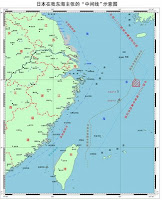Japanese warships sank a Taiwan fishing boat near Diaoyutai Islands. Taiwan Coast Guard sent in two ships to examine the situation, but was later ordered by Taiwan Foreign Ministry to back down from a standoff engagement with Japanese ships.
The islands were traditionally a Chinese territory, a fact supported by historical evidents and recognized by Sino-Okinawa treaties and treaties between Okinawa and Japanese before it merged into Japan. During WWII and the civil war between Communism and Nationalism, the Islands were under US's control. When US turned the administration of Okinawa to Japan, it also hand over the Diaoyutai Island to Japan, though without recognizing ownership or attachment of the Islands. For a while neither Japan nor Taiwan was enthusiastic over the Islands. Although students and grassroots movements had been protesting the handover in Taiwan, the Taiwan government did not do anything to bring up the issue. At the time, Beijing was happy to see it a sign of declining US influence in the region. To an extent, it's something to celebrate. The Diaoyu Island became an increased focus of conflict between China and Japan in the recent years amid the change in the political environment. While Beijing becomes more confident in handling foreign affairs, one of the student activist became the President of Taipei in 2008.
Beijing expressed regret and disappointment over the incident, while the president of Taiwan reaffirmed his stance that Diaoyutai is sovereign territory of Taiwan (Republic of China). Both Beijing (The People's Republic of China) and Taipei (Republic of China) recognize Diaoyutai as part of China, and both sides agreed that the islands part of Taiwan Province.
The Progressive Party, Taiwan's minority party that just lost its 8 years holding on the President's position in the election, strongly criticized current government's slow and confusing respond to the incident.
Many Taiwan fish men protested at Taiwan Foreign Ministry, and painted Japan's flag black. The wife of the captain of the sunk fishing boat told the press that had her husband raised the five star (Beijing) flag, the ship would be ok, complaining lack of protection by Taiwan government.







